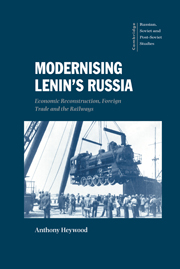Book contents
- Frontmatter
- Contents
- List of illustrations
- List of tables
- Acknowledgements
- Technical note
- List of abbreviations and acronyms
- Introduction
- PART I Towards economic reconstruction, 1917–1920 the birth of the railway imports policy
- PART II Trade and isolation, 1920–1921 implementing the railway imports policy
- PART III Retreat, 1921–1924
- Conclusion
- Notes
- Bibliography
- Index
- Cambridge Russian, Soviet and Post-Soviet Studies
- Plate Section
Introduction
Published online by Cambridge University Press: 14 August 2009
- Frontmatter
- Contents
- List of illustrations
- List of tables
- Acknowledgements
- Technical note
- List of abbreviations and acronyms
- Introduction
- PART I Towards economic reconstruction, 1917–1920 the birth of the railway imports policy
- PART II Trade and isolation, 1920–1921 implementing the railway imports policy
- PART III Retreat, 1921–1924
- Conclusion
- Notes
- Bibliography
- Index
- Cambridge Russian, Soviet and Post-Soviet Studies
- Plate Section
Summary
The transformation of Russia into a major industrial power was a fundamental goal for Lenin and the Bolsheviks. Economic development and industrialisation promised to end centuries of backwardness relative to the West. Technological change was to lead the way from a weak and inefficient capitalist economy – still largely reliant on small-scale peasant production even after a half-century of tsarist industrialisation – towards a prosperous urban socialist society based on scientific planning and modern large-scale production. The transformation of the Russian economy would serve as the catalyst for social revolution by creating the material basis for socialism.
But how in fact did the revolutionaries address economic modernisation during the early Soviet period? After the tsarist regime's prioritisation of railway development and heavy engineering, did Lenin's well-known enthusiasm for nationwide electrification imply a fundamentally new course? How quickly were postwar economic recovery and modernisation to be accomplished? And what of resources? Tsarism's heavy reliance on foreign capital had been criticised by the Bolsheviks for turning Russia into a colony of the major European powers. So did Lenin and his colleagues really want the capitalist world to play a significant part in Soviet economic development? Did they seriously expect to ‘normalise’ economic relations with capitalist countries given their own commitment to world revolution, their abrogation of pre-Soviet debts, the Allied anti-Bolshevik blockade and the foreign intervention in the civil war? Alternatively, did they prioritise the broader goal of international revolution as the means to Russian economic progress?
- Type
- Chapter
- Information
- Modernising Lenin's RussiaEconomic Reconstruction, Foreign Trade and the Railways, pp. 1 - 10Publisher: Cambridge University PressPrint publication year: 1999
- 1
- Cited by

